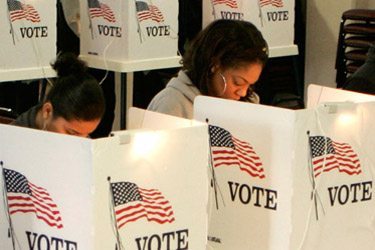ELECTION 2012: Women Told the Nation, Loud and Clear, This Election was About the Economy and Jobs
Women have spoken. And they told the nation, loud and clear, that this election was about the economy and jobs. For women, topics like birth control and equal pay are absolutely economic issues for women. I’ve heard some say we voted with our “ladyparts,” which we certainly care about, but it was bigger than that.

Women have spoken. And they told the nation, loud and clear, that this election was about the economy and jobs. Some pundits and politicians didn’t get it, though. For women, topics like birth control and equal pay—which received a lot of attention in the weeks leading up to the election—are absolutely economic issues for women. I’ve heard some say we voted with our “ladyparts,” which we certainly care about, but it was bigger than that.
Women can’t provide for their families and plan for their futures without birth control and fair pay, and women turned out to vote in a big way—we made up 53 percent of the electorate—to tell politicians just that. Single women, in particular, turned out for President Barack Obama—to the tune of 67 percent. Women and the issues they cared about decided this election, and anyone who says otherwise wasn’t paying attention.
Election Day may be behind us, but women can’t rest on our laurels. We need to make our voices heard and exercise our clout, starting with the lame-duck session and sequestration talks. What transpires in the halls of Congress this December will be critical in determining the direction of the next Congress and this country as a whole.
Indeed, Congress has the chance to be grown-ups and work out a deal in the next month that will prevent the across-the-board spending cuts that are set to begin in January. A deal is possible. If Congress can agree, the president has already expressed his desire for a “grand bargain” and has proven that he is willing to buck his base to make a moderate deal. Advocates who care about women and children need to make it clear that any deal must not be balanced on the backs of the most vulnerable among us and should ensure that the wealthiest 2 percent pay their share. A reasonable balance between increased revenue and targeted spending cuts will enable our economy to grow.
Congress needs look no further than women for models of good government. Women have historically proven to be better about reaching across the aisle. This makes the results of this year’s election—which led to the most women ever in the U.S. Senate at 20 and the House with at least 77 women—particularly exciting. More women in Congress, from both parties, will be critical if a divided Congress is to move past gridlock.
It’s clear that women will play a strong role in the Democratic-controlled Senate. The Democrats would not have retained control without women senators. Many of them were recruited by Sen. Patty Murray (D-WA), giving her clout that she is sure to exercise in a way that benefits women. The “dean of the women,” Sen. Barbara Mikulski (D-MD), will have a full house at her monthly bipartisan dinners for women senators and the chance to extend the bipartisan reach of women’s issues. None of this would be possible without the women’s vote.
Whether Congress decides to work together and move past gridlock has real impact on the work that can be done by advocacy groups like the American Association of University Women. If the gridlock continues, we will need to pay special attention to regulatory reform and enforcement—as well as strategic use of executive orders — as our best remaining avenue to create change.
The election results boil down to two things for women: Women should be excited, and women should be vigilant. Our work began when we got our issues heard and we got to the polls. Like the senior women in the Senate, the American woman voter has clout going forward. We voted our elected officials into office; we must hold them accountable. Let’s seize this valuable opportunity to make progress and ensure that President Obama and Congress dance with the ones who brought them—women.

